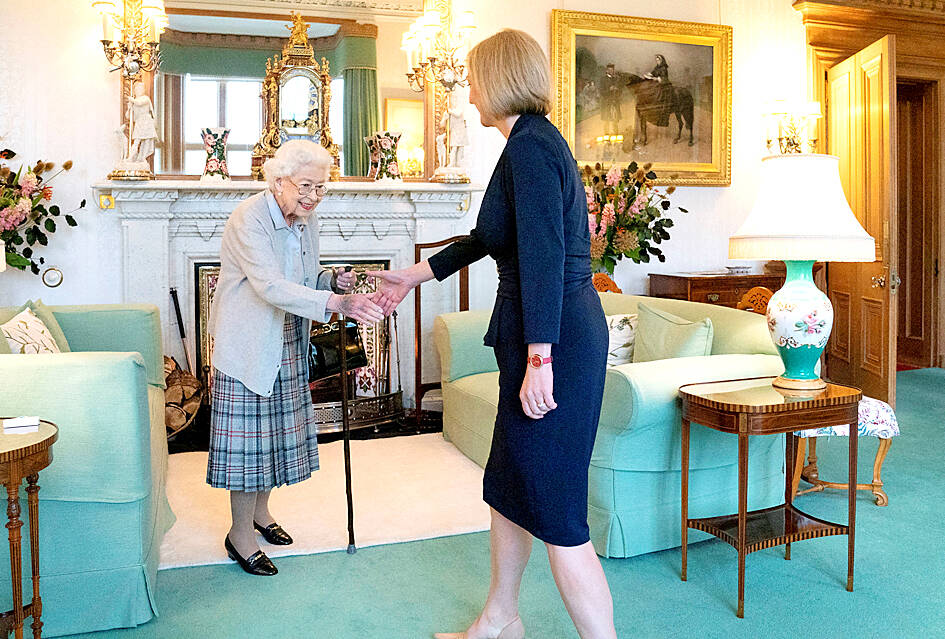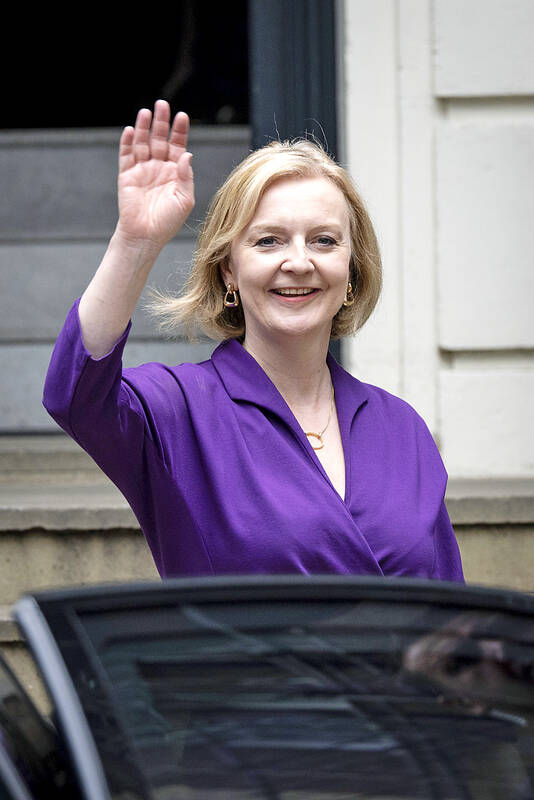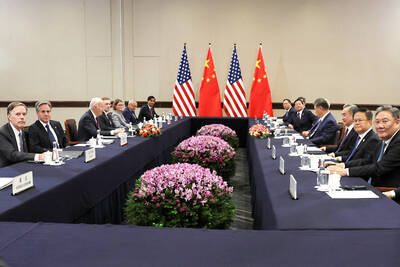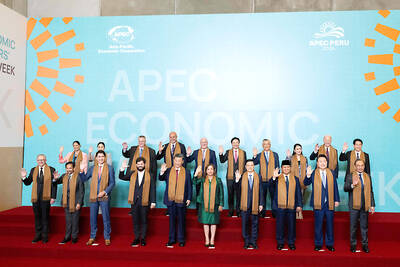One of British politics’ firmest critics of China became prime minister yesterday as Liz Truss replaced Boris Johnson, whose policy toward Beijing failed to harden fast enough for many in his party.
The former British secretary of state for foreign, commonwealth and development affairs officially became the prime minister after her audience at Balmoral Castle with Queen Elizabeth II, who requested her to form a new administration.
Relations between London and Beijing have worsened in the past decade as Britain has grown worried that an open door to Chinese investment could pose national security risks, and that China’s military and economic assertiveness might be acting against its post-Brexit free trade agenda.

Photo: Reuters
Truss views China as a threat to the rules-based international order that has governed post-World War II trade and diplomacy, and she sees it as her role to build a bulwark against that.
“Countries must play by the rules and that includes China,” she said in a high-profile speech earlier this year, adding that Beijing was “rapidly building a military capable of projecting power deep into areas of European strategic interest.”
Truss warned that if China failed to play by global rules it would cut short its rise as a superpower and it should learn from the West’s robust economic response to Russia’s invasion of Ukraine.

Photo: EPA-EFE
She said that China’s rise was not inevitable and the West should ensure that Taiwan can defend itself.
China’s Global Times has dubbed Truss a “radical populist” and said she should drop the “outdated imperial mentality.”
Chinese Ministry of Foreign Affairs spokesperson Mao Ning (毛寧) yesterday said that she hoped relations with Britain would remain “on the right track.”
Truss is expected to appoint a foreign secretary aligned with her world view — with ally James Cleverly tipped to be in line for the job and assisted by Tom Tugendhat, a known China hawk, as security minister.
In Taipei, the Ministry of Foreign Affairs said in statement that Taiwan’s representative office in the UK has sent a congratulatory message from President Tsai Ing-wen (蔡英文) to Truss expressing the warmest congratulations of the government and people of Taiwan on becoming the new British prime minister.
The ministry believes the Taipei-London relations will continue to grow with Truss as prime minister, as she expressed her support for Taiwan on several occasions as British foreign secretary, it said.
Taiwan and the UK share the values of democracy, freedom, human rights and rule of law.
Bilateral relations have improved rapidly in the past few years, as evidenced by increasingly close exchanges in such areas as technology cooperation, energy transition, reciprocal driver’s license recognition, and smart city and aviation services, it said.
The British government also repeatedly expressed its concern over cross-strait tensions while calling for the peaceful resolution of related issues, the ministry added.

ONE LAST TALK: While Xi said that Taiwan was a ‘red line,’ Biden, in what is likely his last meeting with Xi as president, called for an end to China’s military activity around Taiwan China’s military intimidation and economic coercion against Taiwan are the main causes of tensions that are destabilizing peace in the Taiwan Strait, Taipei said yesterday while thanking US President Joe Biden for expressing Washington’s firm stance of maintaining peace and stability in the region. Biden and Chinese President Xi Jinping (習近平) met on Saturday for their third meeting and their first talks in seven months on the sidelines of the APEC forum in Lima, Peru. It was likely Biden’s last meeting as president with Xi. During their conversation, Biden reiterated the US’ opposition to any unilateral change to the “status quo” from either

Taiwan would participate in the 2026 APEC summit to be hosted by China after Beijing promised it would ensure the personal safety of attendees, Taiwanese national security sources said yesterday. The APEC Leaders’ Machu Picchu Declaration announced yesterday said that China would host the APEC summit in 2026. Beijing proposed hosting the summit shortly before this year’s gathering began on Friday, a national security official said, speaking on condition of anonymity. Many APEC members expressed concerns about China hosting the event and said that prior communication over the decision was insufficient, the official said. Taiwan brought up concerns about legal “guidelines” China announced in

SUPPORT: Arms sales to NATO Plus countries such as Japan, South Korea and Israel only have to be approved by the US Congress if they exceed US$25m The US should amend a law to add Taiwan to the list of “NATO Plus” allies and streamline future arms sales, a US commission said on Tuesday in its annual report to the US Congress. The recommendation was made in the annual report by the US-China Economic and Security Review Commission (USCC), which contained chapters on US-China economic and trade ties, security relations, and Taiwan and Hong Kong. In the chapter on Taiwan, the commission urged the US Congress to “amend the Arms Export Control Act of 1976 to include Taiwan on the list of ‘NATO Plus’ recipients,” referring to

Minister of Labor Ho Pei-shan (何佩珊) said she would tender her resignation following criticism of her handling of alleged bullying by Ministry of Labor Workforce Development Agency branch director Hsieh Yi-jung (謝宜容) resulting in the death of an employee. The ministry yesterday gave Hsieh two demerits and said she is subject to review by the Disciplinary Court. The severest possible punishment would be her removal from office and being barred from government jobs indefinitely. Workforce Development Agency Director-General Tsai Meng-liang (蔡孟良) also received a major demerit and was transferred to another position. Premier Cho Jung-tai (卓榮泰) issued a formal apology